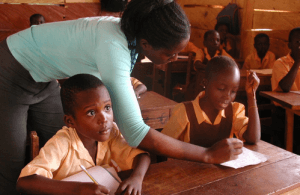Practical learning boosts confidence in science students – Study
 Practical hands-on training for students in the Junior High Schools (JHS) in areas of Science, Technology, Engineering and Mathematics (STEM) has shown to boosts the confidence of students and enables them to be innovative within and outside the classroom.
Practical hands-on training for students in the Junior High Schools (JHS) in areas of Science, Technology, Engineering and Mathematics (STEM) has shown to boosts the confidence of students and enables them to be innovative within and outside the classroom.
This was contained in an 86-page study conducted to ascertain the impact of practical education on students and teachers in the Ghanaian JHS science classrooms.
The findings were presented at a meeting organized by the Practical Education Network (PEN), an organisation, which promotes improved learning outcomes by building the capacity of teachers.
The meeting, held in Accra, was on the theme: “Practical STEM Education in the Ghanaian Classrooms; Its Impact and the Way Forward”.
The research studied 324 students in six JHS Science Classrooms in the Greater Accra Region, where the students were trained on hands-on learning with local materials such as soda, balloon, vinegar and paper.
Mr. Jacob Babb, a researcher with PEN, who presented the findings said three of the schools studied were “comparison schools”, who conducted their classrooms as usual, using mostly the traditional lecture – driven pedagogy.
The other three schools were “experimental schools”, who had PEN-trained teachers conducting practical lessons and used locally available materials to demonstrate science concepts in the national curriculum.
He said differences between the experimental and comparison schools were observed along several dimensions and highlights included changes in students test scores and students attitudes towards science over the course of the study.
He said at the end of the study, students in the normal schools without hands-on learning had 14.60 per cent increase in test scores, while students in the PEN-trained schools with hands-on training had 28.78 per cent increase in test scores.
The Ghana’s educational system, he said, often exhibited a pervasive teacher-centered pedagogy, lack or absence of laboratory materials, poor-quality teacher training, and minimal support systems for teachers.
Mr. Babb said it was for this reason that the research was conducted to give students the needed and required skills and practical training to equip their know-how in STEM.
“The reality in most Ghanaian schools continue to be one where students ‘chew and pour’ facts rather use their hands to conducts experiments and fully understand concepts in the curriculum. Therefore, PEN encourages all educational stakeholders and policy makers in order to swiftly make the systemic change that would surely transform Ghanaian STEM classroom,” he said.
The researcher recommended that the training should be integrated into the Teacher Training Colleges and Universities to maintain the practically-minded teacher workforce.
He said the implementation of hands-on pedagogies be implemented, adding that, coaching and support must be given to teachers to improve the quality of their delivery.
It was suggested that practical science must be measurable, and made a requirement for students to complete their education.
Mr. Anis Haffar, the founder of the GATE Institute, who chaired the meeting, said science was studied to solve societal problems and not just for knowledge.
“The study of STEM should enable the learner to add value to him or herself and as well offer solutions to societal problems,” he said.
Dr. Evelyn Owusu Oduro, the former Executive Secretary of the National Teaching Council said it was necessary to employ teachers who were skillful, adding that, it was unfortunate how some graduates sometimes thought they were capable of teaching because they had acquired tertiary certificates.
Mr. Andrews K. Quaining, the Director of Science Education Unit of the Ghana Education Service said, some teachers had bad attitudes and focused just on getting their students to pass the final examination and ignored helping them with practical hands-on training.
Participants at the meeting requested for proper evaluation to be done on the performance of teachers in classrooms, as absence of evaluation made teachers unproductive.
They also requested for periodic renewal of courses for teachers to remind them of their obligations, in ensuring that students excelled in their studies.
In attendance were teachers from various Municipalities, representatives from the West African Examination Council, the Ministry of Environment, Science, Technology and Innovation and UNESCO.
Source: GNA
